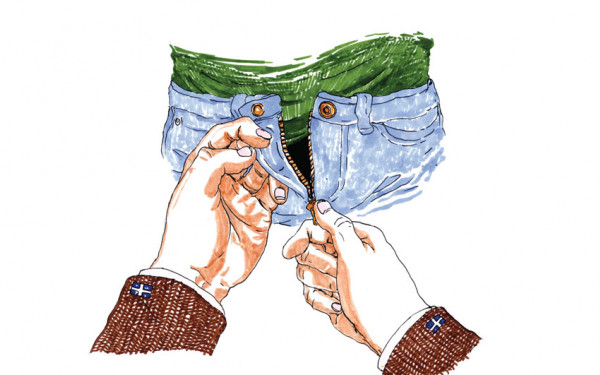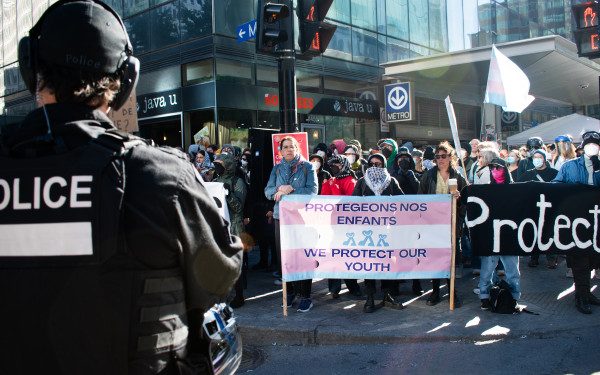Trans People Need More Than Legal Name Changes
For over a year now, Bank of Montreal has been denying my access to over the phone banking because my voice is too deep.
I call them up, trying to figure out how absolutely broke I am, and I’m almost immediately faced with, “Am I speaking with Miss _____, right now?”
“Yes,” I reply. “I just have a really deep voice.”
“Oh. Let me put you on hold.”
They return moments later to let me know I won’t be able to access my bank account over the phone, because my voice is too deep—because I don’t sound like a woman.
I get it—I don’t want anyone stealing my money, I don’t want random people calling up my bank and pretending to be me. But the issue remains that I always go through all the security requirements and am still, at the end, denied access to my account. To access it over the phone, I have to “feminize” my voice.
The gender associated with my voice and the gender associated with my legal name aren’t the same. The reason my voice is so deep (and sexy) is because of my testosterone injections, my hormonal transition, so my voice reflects my actual gender much more than my legal name. This isn’t something I go through so I can later try to hide it by speaking in certain intonations.
Bank of Montreal is apparently the worst bank in Montreal if you’re trans. I have spoken to other trans feminine, trans masculine and non-binary people who have also experienced similar problems with BMO, and what makes them so bad is that they have no specific protocol when helping a trans customer.
Not all banks have this problem. TD Bank puts a note in clients’ files stating “client has lower voice,” and even an area to put the name you actually use in your file, next to your legal name. This is similar to the system available at Concordia.
Though I appreciate that I can access hormone replacement therapy, I don’t have my name legally changed for many reasons. It’s expensive, takes a long time and it’s not my priority—it’s also related to my own survival. I could afford my (life saving) hormones before I could afford to get my name changed.
Bill 103—created by Gender Creative Kids Canada, a Montreal group promoting trans children’s rights—is currently being tabled. It would theoretically allow trans kids under the age of 14 to change their name and gender marker without having to go through gender reaffirming surgeries. People above that age have been able to access name and gender marker without required surgical procedures for just over a year now, as it became official on Oct. 1, 2015.
Removing the necessity of surgery for name and gender marker changes alters the ways bureaucratic society maintains the rigid gender binary—but despite these being bureaucratic changes, let’s not erase the fact that this victory is entirely thanks to the work of trans activists.
The price for trans people to fully change their name and gender marker is $272. You then pay out of pocket to remake all your IDs. Importantly, you can only change your name and gender marker if you’re a Canadian citizen. Quebec is the only province in Canada where all our IDs are based off our birth certificate.
Once names and gender markers are changed, other problems arise. If trans-specific protocol exists, there is often little supporting it—and most cisgender people don’t understand trans issues well enough to implement them. Like Ashley from BMO, who I told I was transgender but had to explain I didn’t have the money to get my name changed.
Whatever Ashley, I don’t need your sympathy, what I need is for these grey areas—where cisgender people can treat trans people how they want—to stop existing.
Once you get your name legally changed, how do you go about informing your landlord, after you’ve already signed the lease with your old name? Since the name change system exists, you can get it changed—but no protocol exists to help you navigate systems of housing and employment once it’s changed.
You go see your landlord, out yourself to them with your shiny new “official government name change” paper, hope they don’t harass you or try to evict you for being trans, and also hope they agree to white-out your old name and write your real name over it. Nothing requires them to allow you.
Employment has its own set of problems. If you work somewhere and aren’t out as trans, then decide to get your legal name changed, and tell your employer, workplace harassment of all kinds are common. That’s the reason some trans folks don’t come out to their coworkers and bosses—or even have jobs. American trans people are unemployed at twice the rate of cisgender Americans.
Provincial housing and labour protection institutions define discrimination and psychological harassment based on the Canadian Charter of Human Rights. Gender identity and gender expression aren’t present in the Charter, only in the Canadian Human Rights Act.
So denying your tenant or employees pronouns, name or gender, or any non-physical hateful actions, aren’t outlined in the Charter of Human Rights and Freedoms as discriminatory. How does that make any sense?
So the name change system exists, but where is the specific procedure for someone who is transitioning in the workplace, for their coworkers and boss to respect? Where is the letter to landlords explaining that they must respect a person’s request to change their name on their lease? Where is every bank’s protocol to help trans customers? Where is the change to the Canadian Charter of Rights and Freedoms?
This is another broken promise. The provincial government can be blamed to a certain extent, but the real danger is cisgender people making choices about trans people’s lives. Nothing is set up to help society re-integrate to trans people’s needs after their medical transitions.
Though we have access to medical transition, name change and gender marker change, we are expected to re-enter society after those events. So where is our help? It’s pretty easy to see that trans people aren’t involved in this legislation and bureaucratic processes that greatly affect our lives.
There is no order of affairs. Trans people have different priorities—some will immediately change their names, some will get hormone replacement therapy first, some will get surgery and some won’t. There is no societal recognition of the complexities of gender transition, and as a result situations like mine become common. Trans people have been left with one option—do your best and hope it works out. That’s not good enough.
Of course, my experiences aren’t universal in the trans community. We all experience individual barriers, oppression and privileges associated with other aspects of ourselves, but dysphoria isn’t bureaucratic. Don’t promise us progressive options while simultaneously restricting us to one.
By the way, the name written at the top of this page isn’t my legal name.
Julien Rose Johnson is an Office Assistant at Concordia Student Union’s off-campus Housing and Job bank. HOJO helps facilitate trans people’s’ navigation of housing and employment.


_600_832_s.png)




